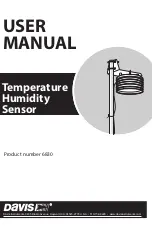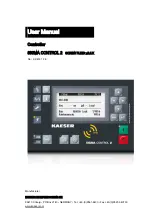
IL05003015E.pdf
5011632305-PH05
2007-05-08
ELC-PH12NNDT
Logic Controller with Special Pulse
Input/Output Function
Instruction Sheet
WARNING
•
This Instruction Sheet only provides descriptions for electrical specifications, general specifications,
installation & wiring, troubleshooting and peripherals. Other detail infromation about programming and
commands is compatible with ELC-PC/PA/PH series; please see ELC Application Manual. For more
information about the optional peripherals , please see individual product manual.
•
This is an OPEN TYPE Controller. The ELC should be kept in an enclosure away from airborne dust, humidity,
electric shock risk and vibration. Also, it is equipped with protective methods such as some special tools or
keys to open the enclosure, so as to avoid the hazard to users and the damage to the ELC.
•
Never connect the AC main circuit power supply to any of the input/output terminals, as it will damage the
ELC. Check all the wiring prior to power up. To avoid any electromagnetic noise, make sure the ELC is
properly grounded
. Do NOT touch terminals when power on.
•
Battery replacement: use UL component type: TDRTL-2150/S lithium battery. Refer to following table for
battery life. (NOTE: RTC should be reset after changing battery).
Temperature (
°
C)
0 25 50 70
Life
(Years)
9 8 6 5
Precision of calendar timer:
At 0
°
C/32
°
F, less than –117 seconds error per month.
At 25
°
C/77
°
F, less than 52 seconds error per month.
At 55
°
C/131
°
F, less than –132 seconds error per month.
•
Warning – Do not disconnect while circuit is live unless area is known to be non-hazardous.
•
Power, input and output (I/O) wiring must be in accordance with Class 1, Div. 2 wiring methods -–Article
501-10(B)(1) of the National Electrical Code.
•
Suitable for use in Class 1, Division 2, Groups A, B, C, D or Non-Hazardous locations only.
•
Warning – Explosion hazard – Substitution of components may impair suitability for Class 1, Division 2.
•
Warning – Explosion hazard – Do not disconnect equipment unless power has been switched off or the area
is known to be Non-Hazardous.
1
INTRODUCTION
5.1 Model Name Explanation and Peripherals
Thank you for choosing Eaton Logic Controller (ELC) series products. The ELC-PH series has a 12-points (8 input
4 outputs) MPU with powerful instructions (the same instruction sets as PC/PA series) for use. It also has
an 8K Steps program memory and high-speed pulse inputs(X10 and X11)/outputs (Y10 and Y11). For high-speed
pulse, total bandwidth can up to 130KHz and 100KHz maximum for single input/output. Besides, it also provides
instructions of position control and zero point return to use with high-speed pulse output.
5.2 Product Profile and Outline
RUN
RUN
ERROR
POWER
E
LC-P
H1
2
NN
DT
Y3
RS
-2
3
2
RS
-4
8
5
Y1
Y2
C2
Y0
C1
Unit: mm
1
Status indicators of POWER, RUN,
ERROR and BAT.LOW
2 RUN/STOP switch
3
VR0: Start-up by M1178/D1178
Corresponding value
4
VR1: Start-up by M1179/D1179
Corresponding value
5 DIN rail clip
6 I/O terminals
7 I/O point indicators
8 COM1 (RS-232) (Rx) indicator
9 COM2 (RS-485) (Tx) indicator
10 COM1 (RS-232) port
11 Nameplate
Warning: Battery replacement: Please change the battery within 3
minutes, or the internal data of the ELC (including the program area,
perpetual calendar and latched registers) could be lost or destroyed.
12
Extension port for wire to connect
extension module/unit
13 Mounting hole
14 DIN rail track (35mm)
15 Extension unit clip
16
RS-485 communication port
(Master/Slave)
17 DC Power input
18
2 pin removable terminal (standard
accessory)
19
Power input cable (standard
accessory)
20 Battery cover
21 Battery socket connection
22 Battery holder
2
FUNCTION SPECIFICATIONS
Items
Specifications
Remarks
Control Method
Stored program, cyclic scan system
I/O Processing Method
Batch processing method (when END instruction is
executed)
I/O refresh instruction is
available
Execution Speed
Basic instructions (several us)
Application Instructions
(10~hundreds us)
Program Language
Instru Ladder Logic + SFC
Including the Step
instructions
Program Capacity
7,920 STEPS
SRAM+ Battery
Instructions
32 Basic sequential instructions (including step
instructions)
168 Application
instructions
Rela
y (bit
mode)
X External Input Relay X0~X177 in octal, 128 points in decimal
Total
256
points
Correspond to external
input point
Y
External Output
Relay
Y0~Y177 in octal, 128 points in decimal
Correspond to external
output point
M
Aux.
Relay
General
M0~M511, 512 points (*1)
Total
4,096
points
Contacts can switch to
On/Off in program
Latched
M512~M999, 488 points (*3)
M2000~M4095, 2,096 points (*3)
Special
M1000~M1999, 1,000 points (some are latched)
T Timer
100ms
T0~T199, 200 points (*1)
Total
256
points
When the timer that set
by TMR instruction
reaches the preset value,
the T contact with the
same number will be On.
T192~T199 for Subroutine
T250~T255, 6 points Accumulative (*4)
10ms
T200~T239, 40 points (*1)
T240~T245, 6 points Accumulative (*4)
1ms
T246~T249, 4 points Accumulative (*4)
C Counter
16-bit
C0~C95, 96 points (*1)
Total
253
points
When the counter that set
by CNT (DCNT)
instruction reaches the
preset value, the C
contact with the same
number will be On.
1-phase high-speed
counter: 20KHz max.
AB-phase high-speed
counter: 4KHz max.
C96~C199, 104 points (*3)
32-bit
C200~C215, 16 points (*1)
C216~C234, 19 points (*3)
32bit
High-speed
C235~C240, 1-phase 1 input, 6 inputs (*3)
C243, C245, 1-phase 1 input, 2 points (*3)
C246~C249, 1-phase 2 inputs, 3 points (*3)
C250, 1-phase 2 inputs, 1 point (*3)
C251~C254, 2-phase 2 inputs, 3 points (*3)
S
Step
point
Initial
S0~S9, 10 points (*1)
Total
1,024
points
Usage device of step
ladder diagram (SFC)
Latched Range:
Start: D1214 (K512)
End: D1215 (K895)
Zero
Return
S10~S19, 10 points, (use with IST instruction)
(*1)
General
S20~S511, 492 points (*1)
Latched
S512~S895, 384 points (*3)
Alarm
S896~S1023, 124 points (*3)
Regi
ster (W
ORD d
at
a)
T
Current Value of the
Timer
T0~T255, 256 points
When the timer reaches
the preset value, the
contact of timer will be
On.
C
Current Value of the
Counter
C0~C199, 16-bit counter, 200 points
C200~C254, 32-bit counter, 50 points
When the counter
reaches the preset value,
the contact of counter will
be On.
D
Data
Register
General
D0~D199, 200 points (*1)
Total
5,000
points
Can be memory area for
storing data. E and F can
be used as the special
purpose of index
indication.
Latched
D200~D999, 800 points (*3)
D2000~D4999, 3,000 points (*3)
Special
D1000~D1999, 1,000 points
Index
E0~E3, F0~F3, 8 points (*1)
No
n
e
File Register
0~1,599(1,600 points) (*4)
Extension register to
store data.
Pointer
N
For Master Control
Nested Loop
N0~N7, 8 points
Control point of master
control nested loop
P
For CJ, CALL
Instructions
P0~P255, 256 points
The location point of CJ,
CALL.
I
Inte
rrup
t Se
rvi
ce
Input Interrupt
I001 (X0), I101 (X1), I201 (X2), I301 (X3), I401 (X4),
I501 (X5); 6 points (all are rising-edge trigger)
The location pointer of
interrupt subroutine
Timer Interrupt
I6
□□
(1ms), 7
□□
(1ms), (
□□=
01~99ms)
High-speed
Counter
I010, I020, I030, I040, I050, I060, 6 points
Communication I150, 1 point
Communication Port in
Series (program read/write)
COM1: only for slave, ASCII/RTU are available, 115,200 bps max.
COM2: can be Maser/Slave, ASCII/RTU are available, 115,200 bps max.
COM1and COM2 can be used simultaneously
Potentiometer / RTC
MPU built-in 2 points VR / MPU built-in RTC
Items
Specifications
High-speed Counter
1-phase 1 input: inputs X10 (C243) and X11 (C245). Input frequency can up to
100KHz. 1-phase 2 inputs: inputs (X10, X11) C250. Input frequency can up to
100KHz.
Position Control
High-speed pulse outputs Y10 and Y11. Output frequency can up to 100KHz. It can
be used as position control of servo drive or step drive when using with position
instructions (DDRVI and DDRVA) and DZRN (zero point return).
*1: The non-latched area is fixed, and can’t be changed.
*2: The non-latched area can be changed to a latched area with parameter setting.
*3: The latched area can be changed to a non-latched area with parameter setting.
*4: The latched area is fixed, and can’t be changed.
M
Auxiliary
Relay
General
Latched
Special auxiliary relay
Latched
M0~M511 M512~M999
M1000~M1999 M2000~M4095
Non-latched (fixed)
Latched (default)
Some are latched and
can’t be changed
Latched (default)
Start: D1200 (K512)
End: D1201 (K999)
Start: D1202 (K2,000)
End: D1203 (K4,095)
T
Timer
100 ms
10 ms
10ms
1 ms
100 ms
T0 ~T199
T200~T239
T240~T245 T246~T249
T250~T255
Non-latched (fixed)
Non-latched (fixed)
Accumulative Latched (fixed)
C
Counter
16-bit count up
32-bit count up/down
32-bit high-speed count
up/down
C0~C95 C96~C199
C200~C215
C216~C234 C235~C245
C246~C255
Non-latched
(fixed)
Latched (default)
Non-latched
(fixed)
Latched (default)
Latched (default)
Start: D1208 (K96)
End: D1209 (K199)
Start: D1210 (K216)
End: D1211 (K234)
Start: D1212 (K235)
End: D1213 (K255)
S
Step relay
For general Latched Special register
Latched
For general
S0~S9 S10~S19 S20~S511
S512~S895
S896~S1023
It is fixed to be non-latched
Factory setting is latched
It is fixed to be latched
Start: D1214 K512
(
)
End: D1215 K895
(
)
D
Register
General Latched
Special
registers
Latched
D0~D199 D200~D999
D1000~D1999 D2000~D4999
Non-latched (fixed)
Factory setting is latched.
Some are latched and
can’t be changed.
Factory setting is
latched.
Start: D1216 (K200)
End: D1217 (K999)
Start: D1218 (K2,000)
End: D1219 (K4,999)
File Register
K0~K1,599, Latched (fixed)
ELECTRICAL SPECIFICATIONS
3
Model
Item
ELC-PH12NNDT
Power Supply Voltage
MPU: 24VDC (-15%~20%) (With DC input reverse polarity protection),
Extension Unit: supplied by the MPU
Fuse 2A
Power Consumption
4W MAX
Insulation Resistance
5 M
Ω
and above at 500 VDC (Between all inputs / outputs and earth)
Noise Immunity
ESD: 8KV Air Discharge
EFT: Power Line: 2KV, Digital I/O: 1KV, Analog & Communication I/O: 250V
RS: 26MHz~1GHz, 10V/m
Grounding
The diameter of grounding wire cannot be smaller than the wire diameter of
terminals 24V and 0V (All ELC units should be grounded directly to the ground
pole).
Environment
Operation: 0
℃
~55
℃
(Temperature), 50~95% (Humidity), Pollution degree 2;
Storage: -25
℃
~70
℃
(Temperature), 5~95% (Humidity)
Agency Approvals
UL508
UL1604, Class1,Div2 Operating temperature code: T5
European community EMC Directive 89/336/EEC and Low Voltage Directive
73/23/EEC
Vibration / Shock Resistance
Standard: IEC61131-2, IEC 68-2-6 (TEST Fc) / IEC61131-2 & IEC 68-2-27 (TEST
Ea)
Weight (approx.) (g)
158
Input Specifications
Output Specifications
Input Type
Photo coupler Isolation
Output Type
Transistor
Input Current
24VDC 5mA
Rated Current
0.3A/1 point @ 40
℃
(Room
Temp.)
Active Level
X0,X1,X10,X11:
Off
→
On, 18.5VDC and above
X2~X5:
Off
→
On, 16.5VDC and above
Voltage Specification
5~30VDC
Max. Inductive Load
7.2W/24V
Output
Protection
Internal
None
Outside
Rated value according to the load
X0~X11: On
→
Off, below 8VDC
Maximum Loading
Y0, Y1
9W / 1 point
Response Time
X0~X5
10ms or 0~20ms
(Setting by D1020)
Y10, Y11 0.9W / 1 point
Response Time
Off
→
On
<20us
<1us (Y10, Y11 only)
X10, X11 The constant of filter





















